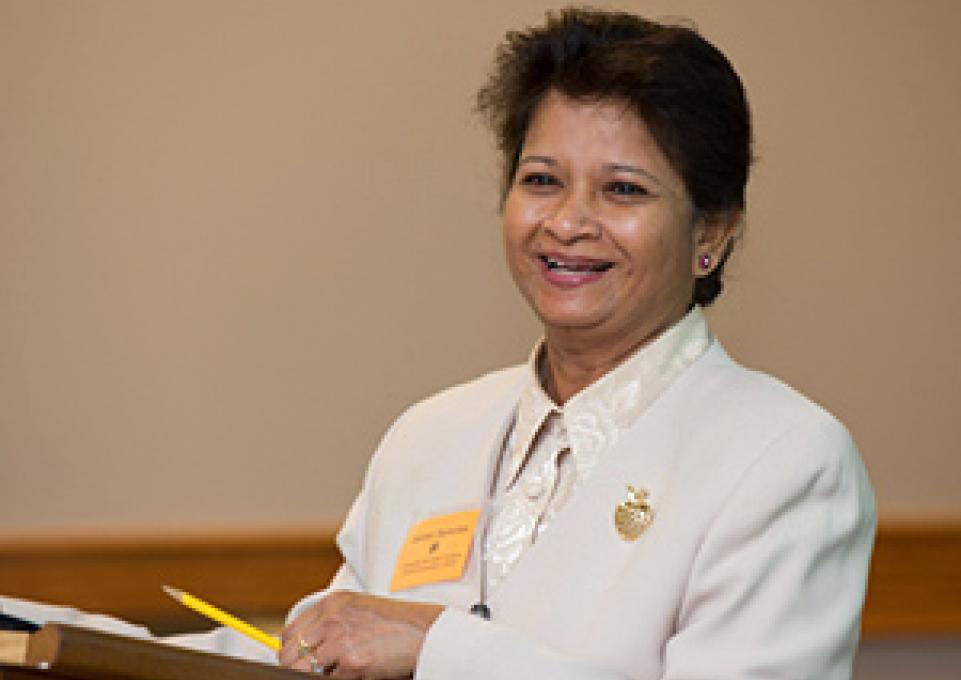
Despite loving language and majoring in English as an undergraduate in Calcutta, India, Sarbani Banerjee, professor of computer information system (CIS), also minored in mathematics at her father’s insistence.
“My father always encouraged math skills and believed further study would improve my scores on the high-level India administrative service exam,” said Banerjee, who joined Buffalo State in 2000.
Banerjee is grateful for her father’s influence. She scored well on the exam and made the decision to pursue her doctorate in education at the University at Buffalo. It was there that she discovered computer science and earned an additional master’s in that discipline.
She is passionate about the field and is working to reverse the growing disparity between men and women working in the profession. Consider this: Three decades ago, 35 percent of computer science professionals were female; today, they make up only 15 to 17 percent. Those statistics are also reflected in the makeup of global companies such as Google and Microsoft that are leading the industry.
“It’s so important to have diversity in technology,” she said. “Inclusion inspires innovation.”
Banerjee partially attributed the drop to disillusionment in computer jobs after the dot com bust, which affected women more than men. Additionally, she points to four main myths that are discouraging girls from applying to college computer science programs:
- Computer science is hard.
- You need to be a math expert
- The field is male-dominated, so women don’t have a chance.
- It’s boring.
Banerjee wants to dispel those myths and believes the dispiriting trend can be reversed with proper outreach and education. In spring of 2015, she founded Buffalo State’s Women in Computing Club, which has grown to 10 members, four of whom serve as officers. The upperclassmen tutor the younger CIS students and host special events.
“If you teach women computing, you are teaching the whole community,” she said. “As women, we tend to share what we have learned.”
On December 10, the club members, with help from CIS faculty, hosted “Hour of Code for Girls,” part of a national initiative sponsored by the nonprofit Code.org to attract more females and minorities to computer science. Thirteen girls came to campus from as far away as Webster and Jamestown to participate in an evening of projects ranging from web design to Javascript.
“It was a very successful first-time event,” Banerjee said. “The girls were engaged in the activities.”
Additionally, Banerjee and her CIS colleagues offer free workshops to Western New York math and science teachers through the Google-funded Computer Science for High School (CS4HS), encouraging them to incorporate computational concepts in fun and relevant ways into the classroom. They also host CS4HS showcases for middle- and high school-students to participate in a campus competition each summer, with the hope that they will see what Buffalo State and the field of computer science has to offer.
At a time when college graduates are vying for lucrative jobs, the computer-science field needs workers. And that will only increase. According to the National Center for Women in Technology (NCWIT), by the year 2018, there will be 1.4 million computer science jobs, but only 400,000 college graduates to fill them.
“This is a ripe opportunity for women to choose this field of study,” Banerjee said. “There are myriad career opportunities awaiting them with the right education and training.”
About Sarbani Banerjee
After earning a master’s degree in English from Jadavpur University in Calcutta, India, Banerjee earned two master’s degrees (computer science and education) and a doctorate in education (concentration: education statistics) from the University at Buffalo. Beginning in 1989 Banerjee worked for UB as a lead programmer analyst, director of the Educational Technology Center in the Pharmacy School, and director of the Technology Node. She joined Buffalo State's CIS Department as an assistant professor in 2000 and was promoted to full professor in fall 2015. Her research interests include computer use and wage differentials among U.S. and foreign-born workers; Internet use and race; and attracting underrepresented students to engineering and computer science.
